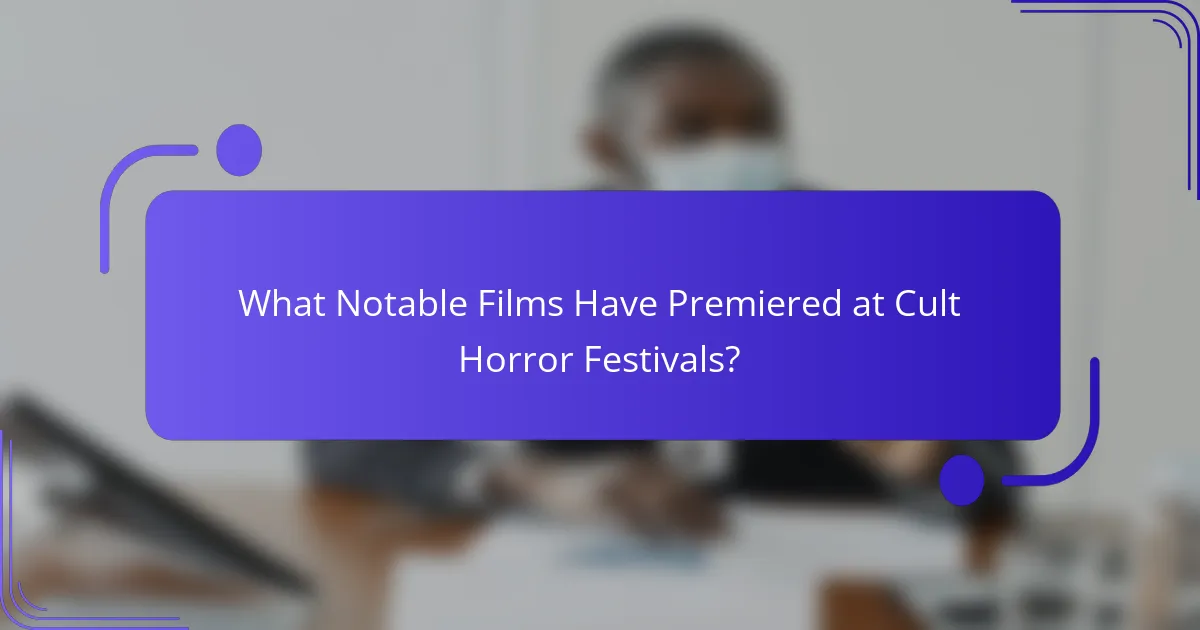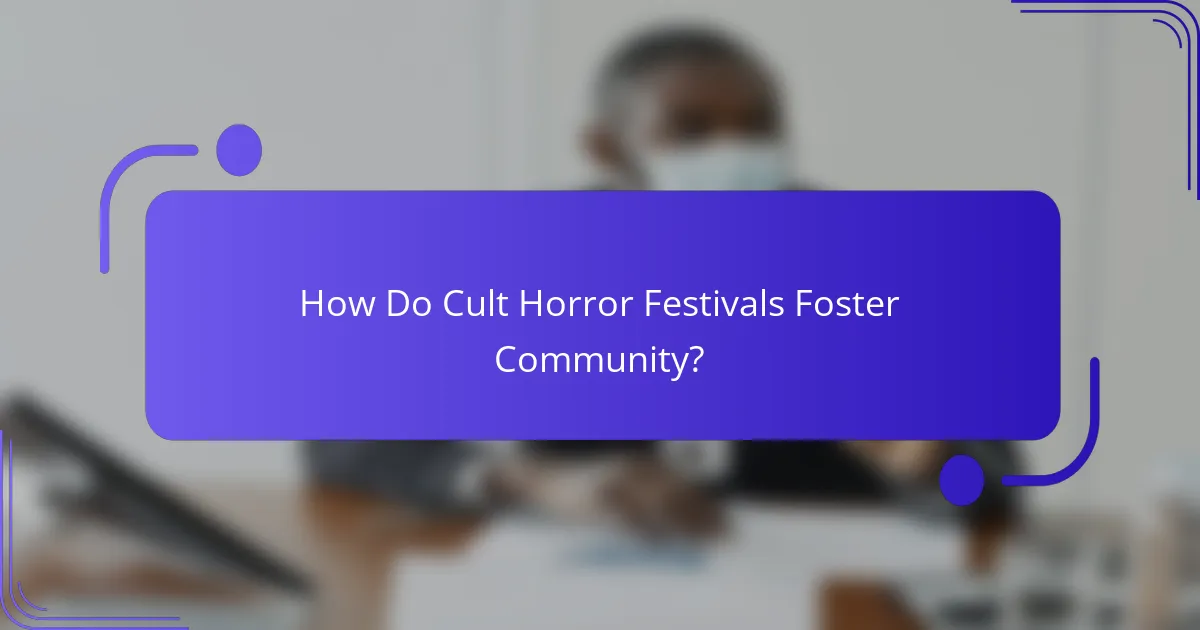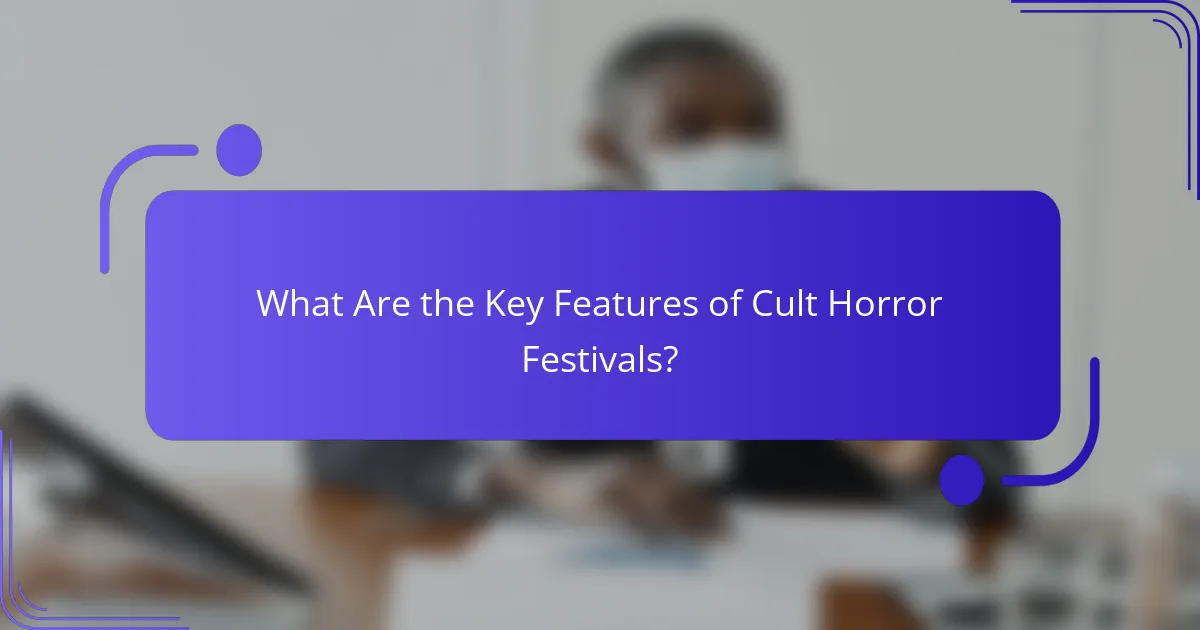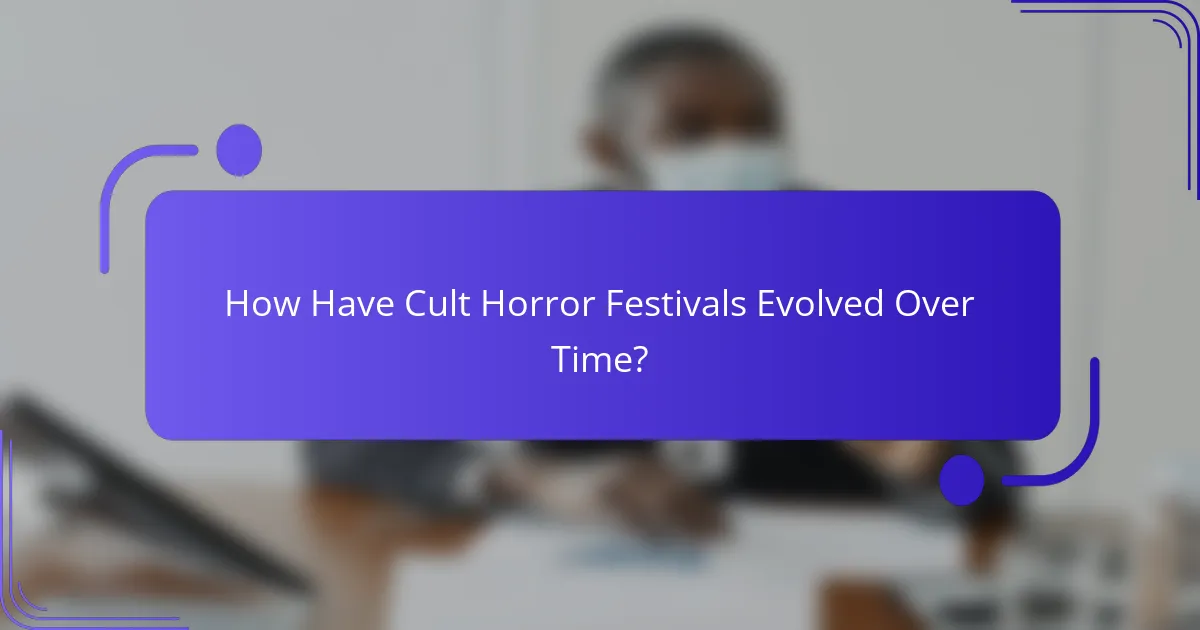Iconic cult horror festivals are vibrant celebrations of the horror genre, featuring a mix of film screenings, discussions, and community engagement. These events not only spotlight independent and classic horror films but also foster a unique sense of community among fans and filmmakers, creating lasting connections and cultural impacts within the genre.
![]()
You can learn more in Iconic Cult Horror Festivals.
What Are the Most Iconic Cult Horror Festivals?
Iconic cult horror festivals are events that celebrate the genre of horror through film screenings, discussions, and community engagement. These festivals often showcase independent films, classic horror, and unique storytelling, attracting enthusiasts and filmmakers alike.
Sundance Film Festival
The Sundance Film Festival, held annually in Park City, Utah, is one of the most prestigious film festivals in the world. While it primarily focuses on independent films, it features a notable selection of horror films that challenge conventions and explore new narratives.
Attendees can expect a mix of premieres, panel discussions, and networking opportunities. The festival is known for launching successful films, making it a key platform for horror filmmakers seeking recognition.
Fantasia International Film Festival
Fantasia International Film Festival, located in Montreal, Canada, is renowned for its diverse programming that emphasizes genre films, particularly horror, fantasy, and science fiction. This festival showcases a wide array of international films, often highlighting unique voices and innovative storytelling.
With a vibrant atmosphere, Fantasia offers screenings, Q&A sessions, and workshops, creating a community-focused experience. It’s an excellent venue for discovering emerging talent and cult classics.
Frameline Film Festival
Frameline Film Festival, based in San Francisco, California, is the longest-running [censured] film festival in the world. While it primarily focuses on [censured] cinema, it includes a selection of horror films that explore themes of identity and community.
This festival provides a platform for filmmakers to present works that challenge societal norms, often blending horror with social commentary. Attendees can engage with filmmakers and participate in discussions that enrich the viewing experience.
Toronto After Dark Film Festival
Toronto After Dark Film Festival is a celebrated event in Canada that specializes in horror, sci-fi, and action films. It features a mix of international and local films, providing a stage for indie filmmakers to showcase their work.
The festival is known for its late-night screenings and interactive audience experiences. It’s an ideal destination for horror fans looking to discover new films and engage with like-minded individuals.
Overlook Film Festival
The Overlook Film Festival, held in New Orleans, Louisiana, is dedicated to horror and genre films, offering a unique blend of screenings, immersive experiences, and special events. This festival emphasizes community and creativity, often incorporating local culture into its programming.
Attendees can participate in workshops and discussions, making it a great opportunity for networking and learning. The festival’s atmosphere fosters a sense of belonging among horror enthusiasts and creators alike.

What Notable Films Have Premiered at Cult Horror Festivals?
Cult horror festivals have served as launchpads for many iconic films that have defined the genre. These festivals often showcase innovative storytelling and unique perspectives, attracting dedicated audiences and creating lasting cultural impacts.
The Blair Witch Project
Premiering at the Sundance Film Festival in 1999, “The Blair Witch Project” became a landmark in horror cinema. Its found-footage style and grassroots marketing strategy revolutionized how horror films were produced and promoted, leading to a significant box office success despite a modest budget.
The film’s authenticity and immersive storytelling captivated audiences, making it a quintessential example of how cult horror festivals can elevate independent films to mainstream success.
Get Out
The film’s unique blend of humor and horror, along with its thought-provoking themes, helped it achieve both commercial success and numerous accolades, including an Academy Award for Best Original Screenplay.
Hereditary
Released at the Sundance Film Festival in 2018, “Hereditary” quickly became a modern classic in the horror genre. Directed by Ari Aster, the film delves into themes of grief and family trauma, presenting a chilling narrative that unsettles viewers on multiple levels.
Its psychological depth and disturbing imagery have sparked discussions about the nature of horror, showcasing how cult horror festivals can highlight films that push the boundaries of traditional storytelling.
It Follows
The film’s innovative approach to horror and its haunting score have garnered a dedicated following, illustrating the potential for cult horror festivals to spotlight groundbreaking narratives that challenge genre conventions.
Train to Busan

How Do Cult Horror Festivals Foster Community?
Cult horror festivals create a unique sense of community by bringing together fans, filmmakers, and industry professionals who share a passion for the genre. These events provide a platform for networking, collaboration, and shared experiences that strengthen bonds among attendees.
You can explore more about these gatherings in cult horror movie festivals.
Networking Opportunities
Cult horror festivals offer numerous networking opportunities for attendees to connect with like-minded individuals. Participants can meet filmmakers, actors, and producers, which can lead to collaborations on future projects. Engaging in informal discussions during screenings or social events can also spark creative ideas and partnerships.
To maximize networking, consider attending industry meet-and-greets or workshops, where you can exchange contact information and discuss potential projects. Bringing business cards or a digital portfolio can be beneficial for making lasting impressions.
Interactive Panels
Interactive panels at cult horror festivals allow fans and creators to engage in meaningful discussions about filmmaking, storytelling, and genre trends. These panels often feature Q&A sessions, providing attendees with the chance to ask questions directly to industry experts. This interaction fosters a deeper understanding of the craft and encourages dialogue among participants.
When attending panels, prepare thoughtful questions in advance to facilitate discussion. Participating actively can enhance your experience and help you connect with others who share your interests.
Audience Engagement Activities
Audience engagement activities, such as horror trivia contests or costume competitions, are common at cult horror festivals and help create a lively atmosphere. These activities encourage participation and camaraderie among attendees, making the festival experience more memorable. They also provide opportunities for fans to showcase their knowledge and creativity.
To get the most out of these activities, consider joining in on group games or workshops. Engaging with others in a fun setting can lead to new friendships and enhance your overall enjoyment of the festival.

What Are the Key Features of Cult Horror Festivals?
Cult horror festivals are characterized by their unique programming, integration with local culture, and a strong emphasis on merchandise and memorabilia. These festivals create a vibrant community atmosphere that celebrates niche horror films and fosters connections among fans and creators.
Unique Programming
The programming at cult horror festivals often includes a mix of classic and contemporary films, special screenings, and director Q&A sessions. Many festivals showcase rare or hard-to-find titles, giving attendees the chance to experience films that may not be widely available. Some events even feature themed nights or marathons that cater to specific sub-genres, such as slasher films or psychological thrillers.
Additionally, workshops and panels led by industry professionals provide insights into filmmaking techniques, special effects, and the horror genre’s evolution. This unique programming encourages audience engagement and enhances the overall festival experience.
Local Culture Integration
Cult horror festivals often reflect the local culture by incorporating regional themes, traditions, and even local filmmakers into their programming. This integration helps create a sense of community and allows attendees to connect with the cultural context of the films being shown. For example, festivals in Europe might highlight local horror legends or folklore, while those in the U.S. may focus on iconic horror films that resonate with the local audience.
Moreover, local food vendors and artists are frequently featured, providing a taste of the area’s culinary and artistic offerings. This not only supports local businesses but also enriches the festival atmosphere.
Merchandise and Memorabilia
Merchandise and memorabilia play a significant role in cult horror festivals, with vendors offering a wide range of items, from limited-edition prints to collectibles. Attendees often seek out unique items that celebrate their favorite films and filmmakers, making this an essential aspect of the festival experience. Common merchandise includes T-shirts, posters, and autographed memorabilia.
Many festivals also host exclusive merchandise launches or collaborations with artists, creating a buzz among fans. This focus on collectibles not only enhances the festival’s appeal but also fosters a sense of belonging within the horror community.

How Have Cult Horror Festivals Evolved Over Time?
Cult horror festivals have transformed significantly since their inception, reflecting changes in audience tastes and the film industry. Initially focused on niche audiences, these festivals now attract a broader demographic, showcasing a mix of classic and contemporary horror films.
Historical Milestones
The evolution of cult horror festivals can be traced back to the late 20th century, with events like the Cannes Film Festival beginning to recognize horror as a legitimate genre. The 1970s and 1980s saw the rise of dedicated horror festivals, such as the Fantasia International Film Festival in Canada, which provided a platform for independent filmmakers.
In the 1990s, the popularity of horror films surged, leading to more festivals worldwide, including the Sitges Film Festival in Spain. These events began to include not only screenings but also panels, workshops, and networking opportunities for filmmakers and fans alike.
Today, cult horror festivals like the Overlook Film Festival and the Brooklyn Horror Film Festival continue to evolve, often incorporating virtual components to reach global audiences. This adaptability has allowed them to thrive even during challenging times, such as the COVID-19 pandemic, ensuring that the cult horror community remains vibrant and engaged.